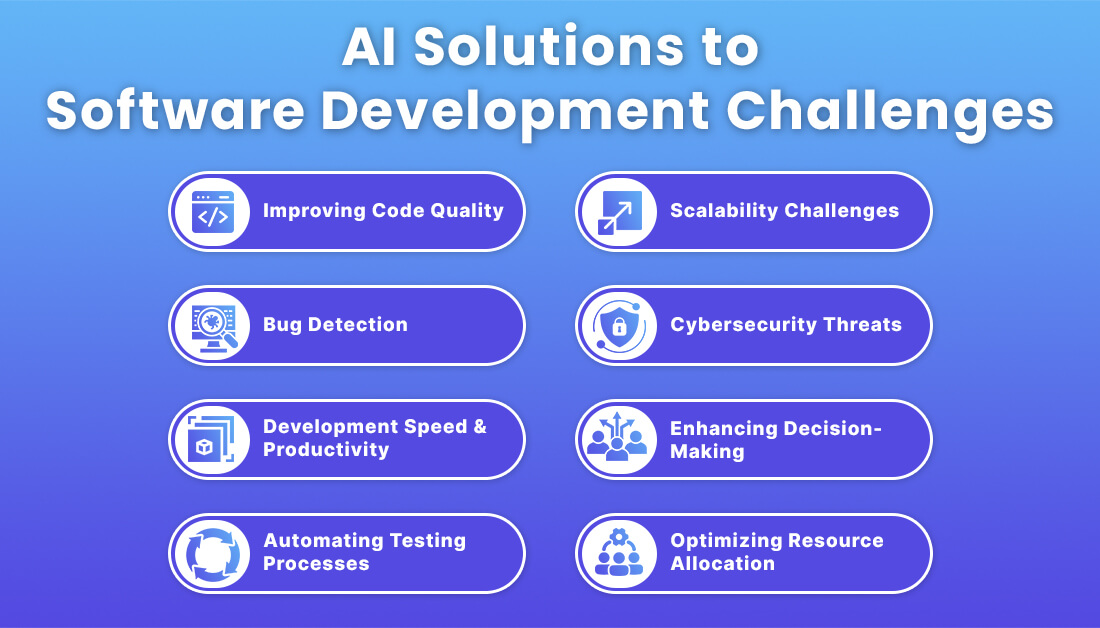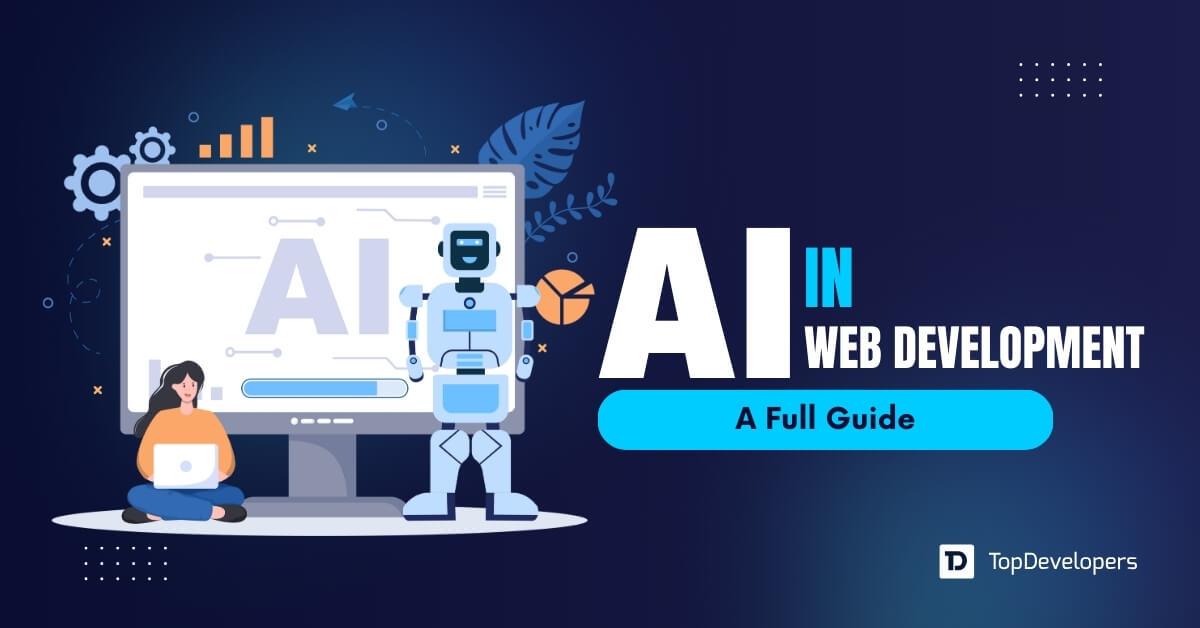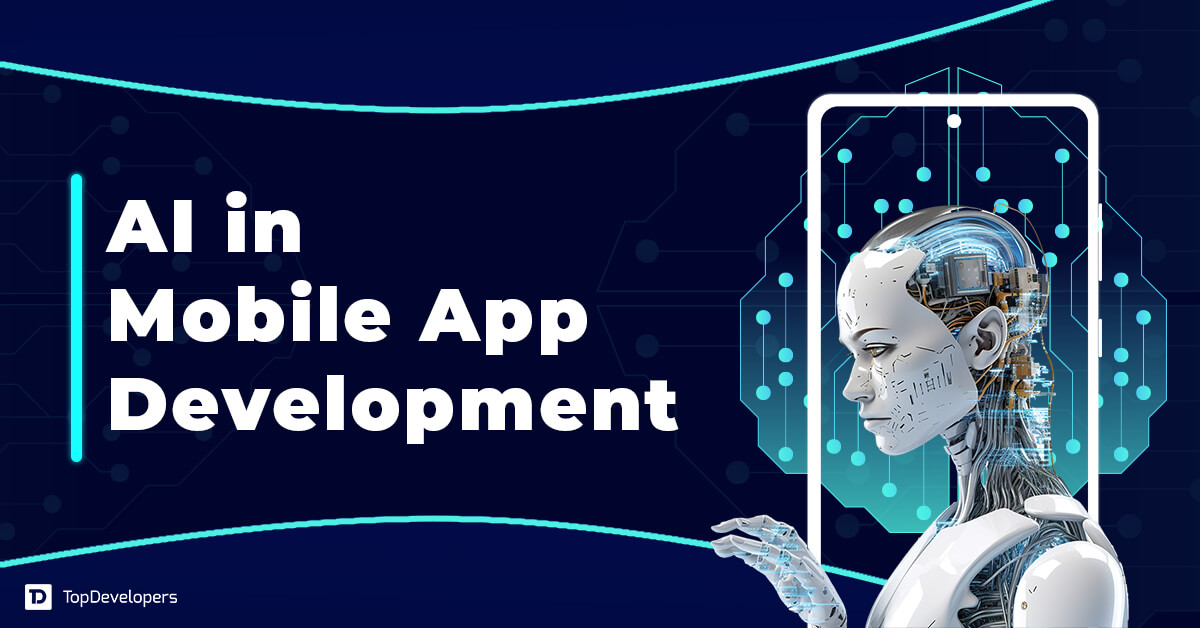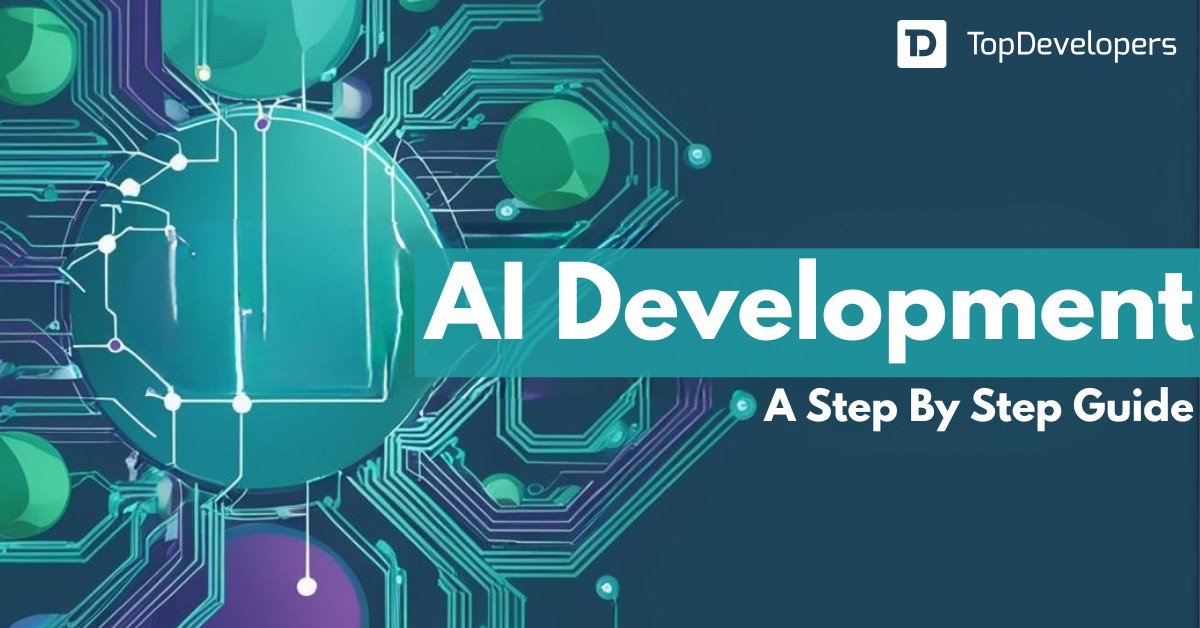
Did you know that over 60% of software development time is spent on debugging and testing? For developers, this translates to countless hours spent resolving issues instead of channeling their energy into innovation and building exceptional products. Couple this with the challenges of meeting tight deadlines, managing resources effectively, and ensuring scalability, and it’s no wonder software development is often a daunting process.
In the face of these challenges, AI in software development is emerging as a powerful partner, automating time-consuming tasks, improving code quality, and addressing challenges that have long troubled the software development process. In this article, we’ll delve into the key challenges in software development and how AI is effectively solving them.
This article dives into the most pressing challenges in software development and explores how AI offers innovative, efficient, and practical solutions to overcome them.
Table of Contents
The Role of AI in Overcoming Software Development Challenges
Improving Code Quality
Maintaining high-quality code is one of the most critical yet challenging aspects of software development. Inconsistent coding practices, overlooked inefficiencies, and inevitable human errors can lead to vulnerabilities, technical debt, and increased maintenance costs. This challenge becomes even more pronounced in large codebases or when software development teams work across different time zones and skill levels.
AI Solution: Revolutionizing Code Quality
Artificial Intelligence is transforming how software developers write and maintain code. AI coding tools like DeepCode and Codacy leverage advanced algorithms to analyze entire codebases in real time. These AI tools for programming identify inefficiencies, flag potential issues, and enforce coding standards, ensuring that the code adheres to best practices.
For example, DeepCode scans code for security vulnerabilities and suggests fixes before they cause significant problems. Similarly, Codacy provides actionable insights, such as identifying unused variables or suggesting optimized solutions for complex code segments.
By integrating these AI-driven tools into the software development process, teams can produce robust, maintainable, and high-quality code consistently. Developers save time, avoid common pitfalls, and deliver projects that are more secure and efficient.
Bug Detection
Detecting and fixing bugs is a cornerstone of software development, but the manual process can be both tedious and error-prone. Developers often spend countless hours sifting through lines of code to find the root cause of issues, and even then, some bugs can go unnoticed until they cause significant disruptions in production. This not only delays project timelines but also affects the overall quality and reliability of the software.
AI Solution: Real-Time Bug Detection and Resolution
Artificial Intelligence is reshaping the way bugs are identified and resolved. AI-powered tools like SonarQube scan codebases in real time, pinpointing bugs and vulnerabilities as developers write code. These tools go beyond simple error detection by offering actionable suggestions to resolve issues before they escalate into critical problems.
For instance, SonarQube identifies code smells, security vulnerabilities, and performance bottlenecks, providing developers with a clear path to fix these issues. This ensures that bugs are addressed proactively, saving time and reducing the risk of defects making it to production.
By integrating AI tools into the development workflow, teams can drastically reduce debugging time, maintain higher code quality, and deliver more reliable software. The result? Faster development cycles and happier end-users.
Development Speed and Productivity
In today’s fast-paced tech landscape, meeting deadlines without compromising on code quality is a constant challenge for developers. The pressure to deliver quickly often leads to long working hours, increased stress, and, in some cases, rushed solutions that might lack long-term reliability.
AI Solution: Accelerating Development with AI
AI-powered coding tools like GitHub Copilot are transforming how developers write code by acting as intelligent coding assistants. These programming tools leverage machine learning models to understand context and provide real-time code suggestions, autocompletions, and even entire function blocks based on the developer’s intent.
For example, GitHub Copilot can generate boilerplate code, suggest best practices, and even predict the next lines of code a developer might write. This reduces the time spent on repetitive tasks and allows developers to focus on solving complex problems and implementing innovative features.
By enabling faster development cycles and streamlining workflows, AI-powered tools help teams meet tight deadlines without sacrificing code quality. The result is increased productivity and more efficient project delivery, giving businesses a competitive edge in the market.
Automating Testing Processes
Testing is a critical phase of software development, but manual testing can be incredibly time-consuming and prone to human error. It often falls short in identifying all potential edge cases, leading to undetected issues that may surface in production. This not only impacts the software’s reliability but also increases the risk of costly fixes later in the software development cycle.
AI Solution: Smarter, Faster Testing
AI-driven tools like Testim and Applitools revolutionize the software testing process by automating test case generation and execution. These tools leverage machine learning algorithms to identify patterns and anomalies, ensuring comprehensive test coverage.
For instance, Testim uses AI to create, maintain, and execute automated tests, adapting to changes in the application’s UI without requiring manual updates. On the other hand, Applitools employs AI for visual testing, detecting even minor discrepancies across different versions of an application to ensure a seamless user experience.
By automating repetitive and complex testing tasks, these tools drastically reduce testing time, improve accuracy, and allow teams to focus on building innovative features. The result is a more reliable and high-quality product delivered on time.
Scalability Challenges
As user bases grow and application demands increase, ensuring software scales smoothly becomes a significant challenge for developers. Poor scalability can lead to performance bottlenecks, downtime, and frustrated users—issues that can negatively impact a business’s reputation and bottom line. Identifying and addressing these challenges manually often requires extensive time, effort, and expertise.
AI Solution: Predictive Scalability with AI
AI algorithms are revolutionizing scalability by proactively analyzing performance metrics and system behavior. These intelligent systems identify patterns in usage, detect potential bottlenecks, and recommend architectural adjustments to optimize performance under increased loads.
For example, AI-powered tools can monitor server response times, database queries, and network traffic to predict when and where scaling might be necessary. They also suggest the best strategies, such as load balancing, serverless architecture, or database optimization, to handle growing demands effectively.
By leveraging AI, businesses can ensure their software is prepared to scale dynamically without compromising performance or user experience. This proactive approach minimizes downtime, optimizes resources, and enhances user satisfaction as the software grows with the business.
Cybersecurity Threats
In an era where cyberattacks are becoming increasingly sophisticated, ensuring software security is paramount. Identifying and mitigating vulnerabilities during development and post-deployment is critical to safeguarding sensitive data and maintaining user trust. However, traditional methods often fall short in detecting emerging threats or responding to them quickly enough.
AI Solution: Real-Time Threat Detection and Mitigation
AI-powered tools like Darktrace and FireEye are transforming the cybersecurity landscape by offering real-time monitoring and threat detection. These tools utilize advanced machine learning algorithms to analyze network activity, application behavior, and user interactions, identifying potential vulnerabilities and unusual patterns that could indicate a security breach.
For instance, Darktrace uses AI to create a dynamic understanding of a system’s “normal” behavior, flagging anomalies that might signify threats such as malware or insider attacks. FireEye, on the other hand, provides actionable insights and predictive analysis to help developers address vulnerabilities before they can be exploited.
By leveraging AI, organizations can stay ahead of cyber threats, reducing the risk of data breaches, minimizing downtime, and ensuring software remains secure and reliable in an ever-evolving digital landscape.
Enhancing Decision-Making
Throughout the software development life cycle, teams are required to make countless decisions—from selecting the tech stack to planning deployment strategies. However, uninformed or poorly calculated decisions can lead to delays, budget overruns, and the need for costly rework. With so many variables at play, relying solely on human intuition often proves insufficient.
AI Solution: Data-Driven Decision Support
Artificial Intelligence is empowering software development team members to make smarter, more informed decisions by analyzing data, predicting outcomes, and providing actionable insights. AI-driven tools evaluate multiple factors such as historical project data, real-time performance metrics, and industry benchmarks to recommend optimal approaches.
For example, AI can predict the impact of a specific feature on system performance, recommend resource allocation strategies, or even suggest the most efficient project timeline. By leveraging predictive analytics, developers and managers gain a clear roadmap for success, minimizing the risks of trial-and-error approaches.
This AI-powered decision-making process not only enhances efficiency but also ensures that every step in the development cycle is aligned with project goals, reducing the likelihood of errors and maximizing ROI.
Optimizing Resource Allocation
Efficient resource allocation is a critical factor in ensuring timely project delivery. However, balancing team workloads, managing timelines, and aligning resources with project demands can be a daunting task—especially in complex or large-scale software development projects. Poor resource management often leads to missed deadlines, budget overruns, and compromised quality.
AI Solution: Intelligent Resource Management
AI-powered project management tools are transforming resource allocation by providing data-driven insights and predictive capabilities. Project management tools like Forecast and Monday.com leverage machine learning algorithms to evaluate project requirements, predict resource needs, and assign tasks to team members effectively.
These tools analyze factors such as project scope, team performance, and historical data to recommend optimal resource distribution. For instance, they can predict potential bottlenecks, highlight underutilized resources, or suggest reassignments to ensure even workload distribution. Additionally, they provide real-time tracking and updates, allowing managers to make proactive adjustments as projects evolve.
By streamlining resource allocation with AI, teams can maximize efficiency, reduce delays, and deliver projects on time and within budget. This approach ensures that every resource contributes effectively to the project’s success.
Conclusion
The challenges faced in software development such as ranging from improving code quality to ensuring scalability can be daunting. However, Artificial Intelligence (AI) has emerged as a transformative solution, addressing these hurdles with precision and efficiency. From automating repetitive tasks and detecting bugs in real time to enhancing decision-making and optimizing resource allocation, AI empowers developers to focus on innovation while delivering high-quality products.
Today, leading software development companies are leveraging AI-powered tools to streamline their workflows, reduce errors, and meet project demands effectively. By integrating AI into their processes, these companies not only enhance productivity but also ensure scalability and security in their solutions.
As businesses continue to seek innovative and reliable software, partnering with software development companies that utilize AI can be the key to staying ahead in the competitive tech landscape. Whether it’s accelerating development cycles or improving user experience, AI-driven development practices are shaping the future of software creation.
 Avantika Shergil
| Jan 9, 2025
Avantika Shergil
| Jan 9, 2025
Avantika Shergil is a technology enthusiast and thought leader with deep expertise in software development and web technologies. With over 8 years of experience analyzing and evaluating cutting-edge digital solutions, Avantika has a knack for demystifying complex tech trends. Her insights into modern programming frameworks, system architecture, and web innovation have empowered businesses to make informed decisions in the ever-evolving tech landscape. Avantika is passionate about bridging the gap between technology and business strategy, helping businesses build customized software and website, and understand about different tools to leverage effectively for their ventures. Explore her work for a unique perspective on the future of digital innovation.






